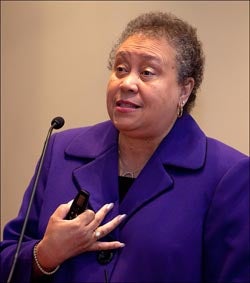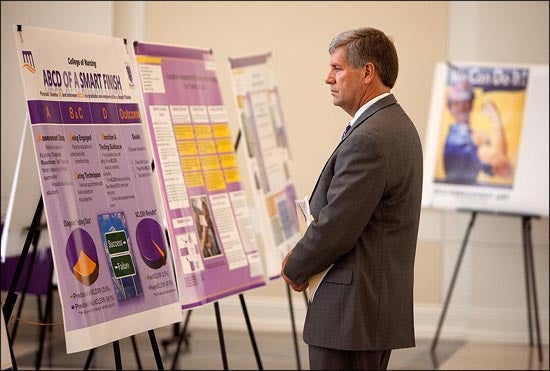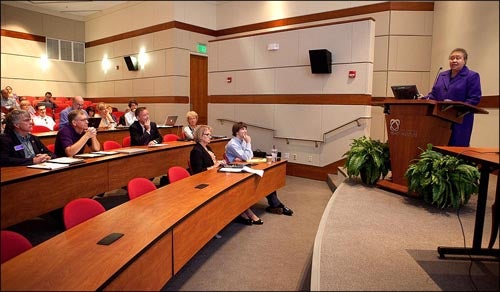‘Ahead of the curve’
SACS president speaks on assessment at ECU
East Carolina University already is ahead of the curve compared to other institutions in measuring student learning, the president of the Southern Association of Colleges and Schools said Friday.

Dr. Belle Wheelan
Dr. Belle Wheelan, SACS president, visited campus Sept. 23 for ECU Assessment Day held in a packed auditorium at the East Carolina Heart Institute. The day included an examination of best practices at ECU through poster presentations and peer discussion, and presentations by Wheelan and Dr. Marilyn Sheerer, ECU provost.
ECU’s self-review comes ahead of the university’s next SACS reaffirmation of accreditation visit scheduled for 2013.
“I think the fact that you’ve got concrete examples of what’s going on in the different departments, that faculty are talking about it not just in the departments but across the campus, and you’re having conversations about learning, that puts you out front of a lot of your peer institutions,” Wheelan said following her presentation.
“There is a better collective understanding of why we do assessments. I really get the feeling just being here today that it’s more than a SACS requirement. It will benefit students, and that’s a good feeling.”
Wheelan is the first African American and the first woman to serve as SACS president in its 116-year history. Her 30-year career includes roles in faculty, student services and campus administration as provost and college president.
Students are the center to success, and faculty must be involved for students to be successful, she said.
She said questions that should be considered include, what skill sets will they take away when they graduate? How does a student’s life improve as a result of being at ECU? How do you expose students to a broad view of the world and how it relates to each discipline? How do you ensure student competitiveness and competence? Wheelan said faculty should match theory taught in class with practical applications in the real world for today’s college students. Leaders should also be mindful that many students, particularly minority students, are the first in their families to attend college.
Data from assessments shouldn’t just be collected, but used for continuing accountability. “You want people to feel good about the degrees students earn at ECU,” Wheelan said.
Assessment has always been a critical part of the academic environment, Sheerer said, and it’s even more so today with emphasis on accountability and demand for use of assessment results in improving the learning environment.
“We still need to keep the expectation of student learning front and center,” Sheerer said.

Assessment Day participants reviewed poster presentations set up outside the auditorium where Belle Wheelan spoke.
